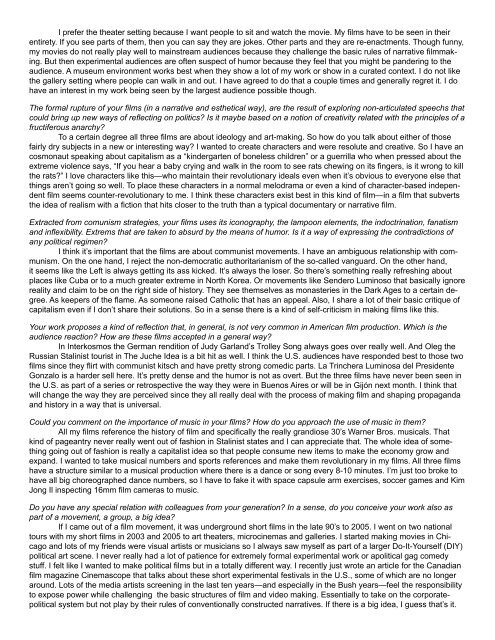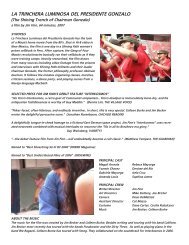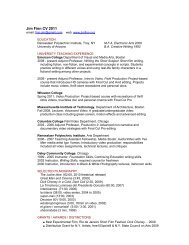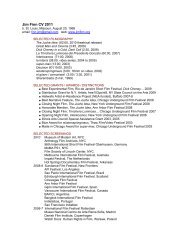The Juche Idea - Jim Finn
The Juche Idea - Jim Finn
The Juche Idea - Jim Finn
Create successful ePaper yourself
Turn your PDF publications into a flip-book with our unique Google optimized e-Paper software.
I prefer the theater setting because I want people to sit and watch the movie. My films have to be seen in their<br />
entirety. If you see parts of them, then you can say they are jokes. Other parts and they are re-enactments. Though funny,<br />
my movies do not really play well to mainstream audiences because they challenge the basic rules of narrative filmmaking.<br />
But then experimental audiences are often suspect of humor because they feel that you might be pandering to the<br />
audience. A museum environment works best when they show a lot of my work or show in a curated context. I do not like<br />
the gallery setting where people can walk in and out. I have agreed to do that a couple times and generally regret it. I do<br />
have an interest in my work being seen by the largest audience possible though.<br />
<strong>The</strong> formal rupture of your films (in a narrative and esthetical way), are the result of exploring non-articulated speechs that<br />
could bring up new ways of reflecting on politics? Is it maybe based on a notion of creativity related with the principles of a<br />
fructiferous anarchy?<br />
To a certain degree all three films are about ideology and art-making. So how do you talk about either of those<br />
fairly dry subjects in a new or interesting way? I wanted to create characters and were resolute and creative. So I have an<br />
cosmonaut speaking about capitalism as a “kindergarten of boneless children” or a guerrilla who when pressed about the<br />
extreme violence says, “If you hear a baby crying and walk in the room to see rats chewing on its fingers, is it wrong to kill<br />
the rats?” I love characters like this—who maintain their revolutionary ideals even when it’s obvious to everyone else that<br />
things aren’t going so well. To place these characters in a normal melodrama or even a kind of character-based independent<br />
film seems counter-revolutionary to me. I think these characters exist best in this kind of film—in a film that subverts<br />
the idea of realism with a fiction that hits closer to the truth than a typical documentary or narrative film.<br />
Extracted from comunism strategies, your films uses its iconography, the lampoon elements, the indoctrination, fanatism<br />
and inflexibility. Extrems that are taken to absurd by the means of humor. Is it a way of expressing the contradictions of<br />
any political regimen?<br />
I think it’s important that the films are about communist movements. I have an ambiguous relationship with communism.<br />
On the one hand, I reject the non-democratic authoritarianism of the so-called vanguard. On the other hand,<br />
it seems like the Left is always getting its ass kicked. It’s always the loser. So there’s something really refreshing about<br />
places like Cuba or to a much greater extreme in North Korea. Or movements like Sendero Luminoso that basically ignore<br />
reality and claim to be on the right side of history. <strong>The</strong>y see themselves as monasteries in the Dark Ages to a certain degree.<br />
As keepers of the flame. As someone raised Catholic that has an appeal. Also, I share a lot of their basic critique of<br />
capitalism even if I don’t share their solutions. So in a sense there is a kind of self-criticism in making films like this.<br />
Your work proposes a kind of reflection that, in general, is not very common in American film production. Which is the<br />
audience reaction? How are these films accepted in a general way?<br />
In Interkosmos the German rendition of Judy Garland’s Trolley Song always goes over really well. And Oleg the<br />
Russian Stalinist tourist in <strong>The</strong> <strong>Juche</strong> <strong>Idea</strong> is a bit hit as well. I think the U.S. audiences have responded best to those two<br />
films since they flirt with communist kitsch and have pretty strong comedic parts. La Trinchera Luminosa del Presidente<br />
Gonzalo is a harder sell here. It’s pretty dense and the humor is not as overt. But the three films have never been seen in<br />
the U.S. as part of a series or retrospective the way they were in Buenos Aires or will be in Gijón next month. I think that<br />
will change the way they are perceived since they all really deal with the process of making film and shaping propaganda<br />
and history in a way that is universal.<br />
Could you comment on the importance of music in your films? How do you approach the use of music in them?<br />
All my films reference the history of film and specifically the really grandiose 30’s Warner Bros. musicals. That<br />
kind of pageantry never really went out of fashion in Stalinist states and I can appreciate that. <strong>The</strong> whole idea of something<br />
going out of fashion is really a capitalist idea so that people consume new items to make the economy grow and<br />
expand. I wanted to take musical numbers and sports references and make them revolutionary in my films. All three films<br />
have a structure similar to a musical production where there is a dance or song every 8-10 minutes. I’m just too broke to<br />
have all big choreographed dance numbers, so I have to fake it with space capsule arm exercises, soccer games and Kim<br />
Jong Il inspecting 16mm film cameras to music.<br />
Do you have any special relation with colleagues from your generation? In a sense, do you conceive your work also as<br />
part of a movement, a group, a big idea?<br />
If I came out of a film movement, it was underground short films in the late 90’s to 2005. I went on two national<br />
tours with my short films in 2003 and 2005 to art theaters, microcinemas and galleries. I started making movies in Chicago<br />
and lots of my friends were visual artists or musicians so I always saw myself as part of a larger Do-It-Yourself (DIY)<br />
political art scene. I never really had a lot of patience for extremely formal experimental work or apolitical gag comedy<br />
stuff. I felt like I wanted to make political films but in a totally different way. I recently just wrote an article for the Canadian<br />
film magazine Cinemascope that talks about these short experimental festivals in the U.S., some of which are no longer<br />
around. Lots of the media artists screening in the last ten years—and especially in the Bush years—feel the responsibility<br />
to expose power while challenging the basic structures of film and video making. Essentially to take on the corporatepolitical<br />
system but not play by their rules of conventionally constructed narratives. If there is a big idea, I guess that’s it.





